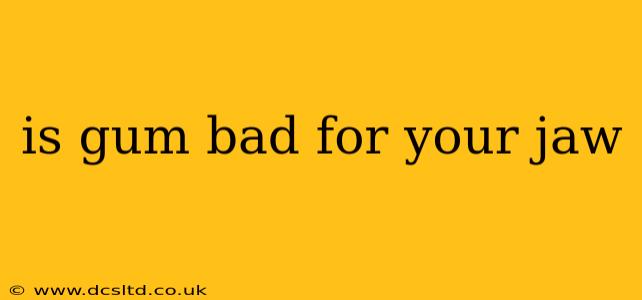Chewing gum is a common habit enjoyed by millions, offering a refreshing taste and a potential mood boost. However, concerns often arise regarding its potential impact on jaw health. Is chewing gum truly detrimental to your jaw? The answer, as with most things, is nuanced and depends on several factors. This article delves into the relationship between chewing gum and jaw problems, addressing common concerns and providing evidence-based insights.
Can Chewing Gum Cause TMJ?
This is a frequently asked question, and the short answer is: it's not a direct cause, but it can exacerbate existing temporomandibular joint (TMJ) disorders. TMJ disorders involve the jaw joint and surrounding muscles, causing pain, clicking, and limited jaw movement. While chewing gum itself doesn't cause TMJ, excessive or forceful chewing can put extra strain on the joint, potentially worsening symptoms for those already experiencing TMJ issues.
Does Chewing Gum Strengthen Jaw Muscles?
Moderate chewing can contribute to jaw muscle strength. Think of it like any other muscle group – regular, controlled exercise strengthens it. However, this benefit only applies to moderate chewing. Excessive chewing can lead to muscle fatigue and strain, negating any potential strengthening effects.
How Much Gum Chewing is Too Much?
There's no magic number, but it's crucial to practice moderation. Listen to your body. If you experience jaw pain, fatigue, or discomfort after chewing gum, reduce the amount you chew or stop altogether. Pay attention to the intensity of your chewing; forceful chewing is more likely to cause problems than gentle chewing.
What Kind of Gum is Best for Your Jaw?
The type of gum doesn't significantly impact the risk of jaw problems. Sugar-free gum is generally preferred for dental health, but the intensity of chewing is the primary concern. Focus on chewing gently and avoiding excessive chewing regardless of the gum type.
Can Chewing Gum Cause Jaw Pain?
Yes, excessive or forceful chewing gum can absolutely lead to jaw pain. This pain can stem from muscle strain, inflammation, or even damage to the TMJ. The pain might manifest as a dull ache, sharp pain, or even headaches. If you experience persistent jaw pain related to gum chewing, consult a dentist or healthcare professional.
Is Sugar-Free Gum Better for Your Jaw?
While sugar-free gum is better for your teeth overall, it doesn't inherently protect your jaw from the effects of excessive chewing. The focus should be on the amount and intensity of chewing, not the specific type of gum.
What are the Alternatives to Chewing Gum?
If you're concerned about the potential impact of chewing gum on your jaw, consider alternatives for stress relief or oral stimulation. These might include:
- Mindfulness exercises: These can help manage stress without putting strain on your jaw.
- Jaw stretches and exercises: These can help improve jaw mobility and reduce muscle tension.
- Stress-reducing activities: Find healthy ways to cope with stress, such as exercise, yoga, or meditation.
In Conclusion:
Chewing gum, when enjoyed in moderation and with gentle chewing, is unlikely to cause significant harm to your jaw. However, excessive or forceful chewing can exacerbate existing TMJ conditions or lead to jaw pain and muscle strain. Listen to your body, practice moderation, and consult a healthcare professional if you experience any persistent jaw pain or discomfort. The key is mindful chewing, not just the type of gum you choose.
